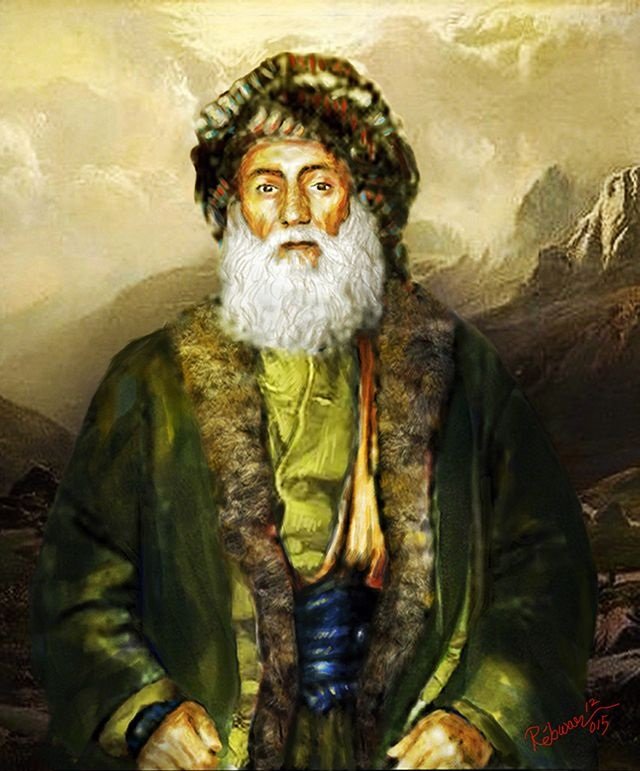Ismail Abulfeda, known as Abulfeda, was a Kurdish 13th/14th-century chronicler, geographer, commander, and Emir of Hama. He wrote "The Concise History of Humanity" which was translated early on into Latin, French & English. The crater "Abulfeda" on the Moon, is named after him.
Shams al-Din Shahrazuri was a 13th-century Kurdish physician, historian, and philosopher. He composed a biographical dictionary about ancient Greek and early Muslim scholars. His philosophical writings focus on Sheikh Suhrawardi& #39;s philosophy of Illuminationism.
Shahab al-Din Suhrawardi was a 12th-century Kurdish philosopher and founder of the Illuminationism school in Islamic philosophy that drew upon Zoroastrian & Platonic ideas. He wrote more than 50 works on philosophy and faith. His thoughts were influenced by Ibn Sina (Avicenna).
Qazi Muhammad was the first President of the first Republic of Kurdistan. His struggle for the people of Kurdistan & their right to self-determination made him a national hero. People arrived from all parts of Kurdistan to join his movement. He gave his life on that path.
Samand Siabandov was a Kurdish author, politician, and officer in the USSR. In WW2 he fought against Nazi Germany and was awarded many times, including "Hero of the Soviet Union" & the Order of Lenin. He also published several poems in Kurdish and an Armenian-Kurdish dictionary.
Meryem Xan is considered the first female singer from Kurdistan whose songs were recorded on gramophones. After the fall of the Ottoman Empire, she fled to her Kurdish relatives in Baghdad, where she recorded around 200 original and cover songs at the studios of Radio Baghdad.
Mahmud Barzinji was King of Kurdistan and fought for the right to self-determination and against Kurdistan being incorporated into British-created Iraq. His government included Muslims & Christians, and feminists like Hapsa Khan opened the first women& #39;s schools during his reign.
Ibn Khallikan was a 13th c. Kurdish scholar, jurist, and writer from Hewlêr (Erbil). He was deputy chief judge in Egypt, later chief judge in Damascus. His most prominent book is "Deaths of Eminent Men & History of the Sons of the Epoch," a biographical encyclopedia of scholars.
Muhammad Salih Dilan was a 20th c. Kurdish poet, singer & activist for the right to self-determination. Considered one of Kurdistan& #39;s greatest poets, Dilan wrote many of his works as a political prisoner. His poems had a considerable impact on Kurdistan& #39;s independence movement.
Mahmud Bayazidi was a 19th c. scholar from Bazîd (Doğubeyazıt). Working with Polish-Russian academic August Żaba, he collected more 50+ works of Kurdish literature for Russia& #39;s Academy of Sciences. He also wrote several books, the most important on contemporary Kurdish customs.
William Yohanna was a 20th-century musician from Sulaimani. His dedication to music & his homeland made him a loved artist throughout Kurdistan. He established several orchestras in Sulaimani, taught thousands of students and created musical works for operas, theaters, and more.
Qadir Dilan, a 20th-century musician and brother of Muhammad Salih Dilan, has created the melody of the famous Newroz song, known all over Kurdistan. In 1948, he & his brother met Kurdish poet Piramerd who wrote the lyrics on a cigarette box, asking them to write a melody for it.
Leyla Qasim, a resistance member from Khanaqin, executed for advocating the right to self-determination. Her last words: "Kill me, but you should know that through my death thousands of Kurds will awake from a deep sleep. I& #39;m glad to give my life on the path to a free Kurdistan."
Sheikh Said of Piran from Erzîrom (Erzurum) was a leader of the 1925-rebellion named after him. The Kurdish leader & his allies, who had close ties to other leaders in Kurdistan, including to King Mahmud, fought Turkey& #39;s repressive policies to gain more rights for Kurdistan.
Osman Sabri was a Kurdish author & politician from Kolik (Kahta). After Sheikh Said& #39;s rebellion was suppressed, he fled to what became Syria & Iraq. There, he published countless newspaper articles on Kurdistan & around ten books. He was jailed 20 times for political activities.
Abdulkadir Can, or Qedrîcan, was an author from Derik. In love with Kurdish literature, he wrote his first poems at university, and thus became a target for Ankara. After Sheikh Said& #39;s rebellion, he fled to West Kurdistan & taught Kurdish there. He published many poems & stories.
The wonderful Rebwar Khalid Tahir is a contemporary artist from Sulaimani in Kurdistan. He& #39;s the one who reinterpreted and created all the shown pieces of art in this thread. Not only is his art beautiful to look at, but it is also an important archive of Kurdish history.

 Read on Twitter
Read on Twitter


















